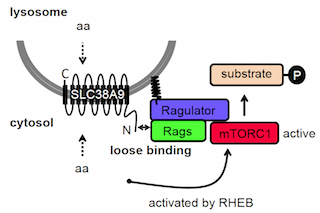02 Jun 2015 - Researchers from IBC2 and BMLS have now made a major step to a better understanding of the genes causing ALS
The serine/threonine kinase mTORC1 regulates cellular homeostasis in response to many cues such as nutrient status and energy level. Amino acids induce mTORC1 activation on lysosomes via the small Rag GTPases and the Ragulator complex, thereby controlling protein translation and cell growth.
As reported in Molecular and Cellular Biology the group of Dr. Christian Behrends identified the human 11-pass transmembrane protein SLC38A9 as a novel component of the Rag-Ragulator complex on lysosomes.
Briefly, SLC38A9 regulates mTORC1 activity in an amino acid and RHEB GTPase dependent manner by defining the intracellular localization of mTOR. Based on these findings, the Behrends lab proposes a new mechanism by which amino acids control mTORC1.
